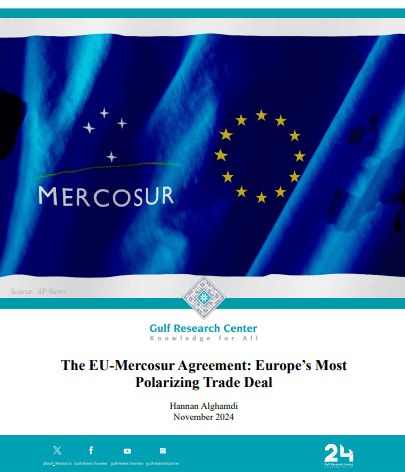
After 25 years of negotiations, the EU-Mercosur Free Trade Agreement (FTA) remains one of the most polarizing trade deals in the current political paradigm. Encompassing over 750 million people and nearly 20% of the global economy, the deal aims to create a vast free trade zone between the European Union (EU) and the Mercosur bloc of South American nations: Argentina, Brazil, Paraguay, and Uruguay, with Bolivia joining in 2024. Despite its promise, the agreement remains mired in controversy, reflecting clashing economic interests, political divides, and environmental concerns. Its significance, however, transcends economics, offering a lens through which to view shifting global alliances and strategic considerations.
A political breakthrough occurred on June 28, 2019, when the EU and Mercosur reached an agreement in principle. The deal proposed eliminating tariffs on 90% of EU industrial exports to Mercosur and all industrial goods imported into the EU from South America. European industries, particularly automotive, machinery, and chemicals, stand to gain significantly. German companies, for example, export €15.4 billion worth of goods annually to Mercosur, supporting over 240,000 jobs. Spain, too, would benefit, with its exports to Mercosur expected to grow by 37%, boosting GDP by 0.23% and creating more than 22,000 jobs. These figures highlight the economic potential of a finalized agreement.
For Latin America, the deal offers an opportunity to solidify access to the EU, one of the world’s wealthiest markets. Mercosur is a major exporter of agricultural goods, contributing one-fourth of the world’s exports in agricultural and fisheries products. Food and live animals accounted for 32.4% of Mercosur’s exports to the EU in 2023, while mineral products made up 29.6%. With vast reserves of critical minerals like lithium, nickel, and manganese, the region could play a pivotal role in Europe’s green energy transition, reducing its dependence on China for these resources. The EU-Mercosur FTA thus promises to reshape global supply chains while driving investments in South American infrastructure and mining.
However, the deal’s benefits are unevenly distributed and fraught with controversy. In Europe, opposition has gathered around agricultural concerns, particularly in countries like France, Ireland, and Poland. France, the EU’s largest agricultural producer, has vocally opposed the agreement, citing risks of unfair competition from cheaper South American beef and poultry. During a visit to Buenos Aires, President Emmanuel Macron called the EU-Mercosur pact "a bad deal," claiming it harmful to Argentina's reindustrialization and European farmers. Macron cited that Argentina’s President Javier Milei also expressed dissatisfaction with the deal and Mercosur's structure. French farmers, backed by their government, argue that Mercosur producers benefit from lower labor and environmental costs, allowing them to undercut European counterparts. President Macron has demanded that the agreement be revised to enforce EU-equivalent standards for imported goods, raising concerns over deforestation in Brazil and the use of hormones in South American cattle.
Poland has joined France in opposing the deal. On November 26, 2024, the Polish parliament voted against the current draft of the EU-Mercosur trade agreement, citing potential negative impacts on Polish farmers and national food security. This decision aligns Poland with France, which has also expressed strong objections to the deal. French lawmakers recently supported President Macron’s stance, emphasizing the need for fair competition and environmental protections.
In a related development, French Prime Minister Michel Barnier is scheduled to visit Italy on December 5, 2024, marking his first bilateral trip since taking office. The visit aims to strengthen Franco-Italian relations and potentially garner Italy's support in opposing the EU-Mercosur trade deal. The timing of this visit—just one day before the planned signing of the agreement in Uruguay on December 6— could be a final effort by France to build a coalition against the deal.
Italy, despite standing to benefit from reduced tariffs on machinery and luxury goods, has echoed concerns about the agreement. Irish farmers, similarly apprehensive about its impact on beef prices, have also protested. These divisions within the EU highlight internal tensions where economic liberalization clashes with social and environmental priorities. If unresolved, these disagreements could further stall or derail the agreement, weakening the EU’s ability to project economic influence globally.
Strategically, the agreement comes at a crucial moment for Europe. Facing escalating trade tensions with its two largest partners, the United States and China, the EU seeks to diversify its economic relationships. Strengthening ties with Mercosur aligns with this goal, offering an alternative to dependence on Chinese minerals and American agricultural imports. Yet delays in ratifying the agreement risk pushing Mercosur countries closer to Asia. In 2023, Mercosur signed a trade agreement with Singapore and is actively negotiating deals with South Korea and Japan, signaling its readiness to pivot away from Europe if necessary.
For the Gulf Cooperation Council (GCC) countries, the EU-Mercosur deal presents both challenges and opportunities. While not directly involved, the GCC has a vested interest in global trade dynamics. The Gulf’s reliance on food imports, particularly from South America, means that changes in EU-Mercosur trade could affect food security in the region. On the other hand, the GCC’s strategic focus on renewable energy and technology aligns with Europe’s green transition. Strengthening ties with the EU, including through parallel trade agreements, could position the Gulf as a key partner in Europe’s sustainability agenda. GCC support for the EU-Mercosur agreement could yield significant diplomatic and economic benefits. Aligning with Europe’s strategic goals would reinforce the Gulf’s role as a global trade and investment hub. Moreover, deeper engagement with Mercosur, either directly or through trilateral initiatives with the EU, could diversify Gulf investments and enhance food security. However, the GCC must also navigate potential competition with Mercosur in sectors like petrochemicals and energy. Balancing these interests requires a nuanced approach, emphasizing collaboration over competition.
The EU-Mercosur agreement showcases the complexity of modern trade negotiations, where economic, environmental, and strategic considerations intersect. For Latin America, it offers a path to economic growth and greater global integration, albeit with challenges in meeting EU standards. For Europe, the deal is a strategic necessity, providing access to critical resources and reducing reliance on China and the United States. Yet internal divisions threaten to undermine its potential, reflecting the difficulty of balancing diverse national interests within the EU.
For the GCC, the agreement illustrates the importance of strategic partnerships in a multipolar world. By supporting the EU-Mercosur deal and pursuing complementary agreements, the Gulf states can strengthen their global standing and secure their interests in an increasingly interconnected economy.
*Hannan Alghamdi is a Researcher at the Gulf Research Center (GRC)

